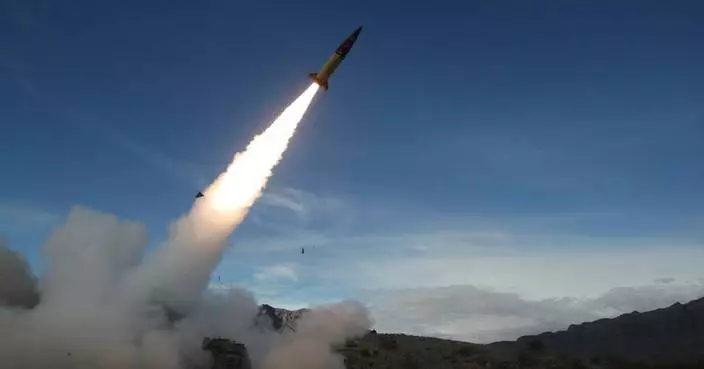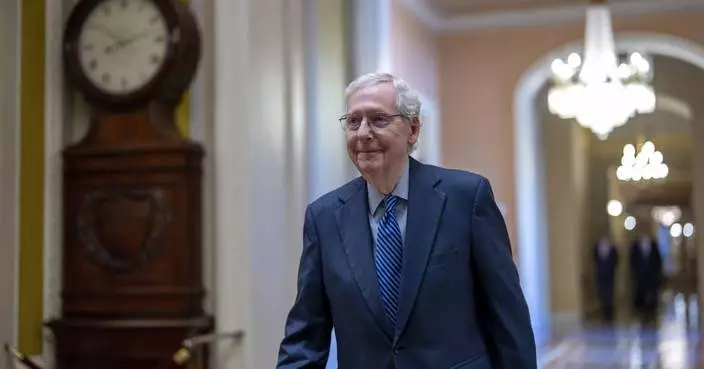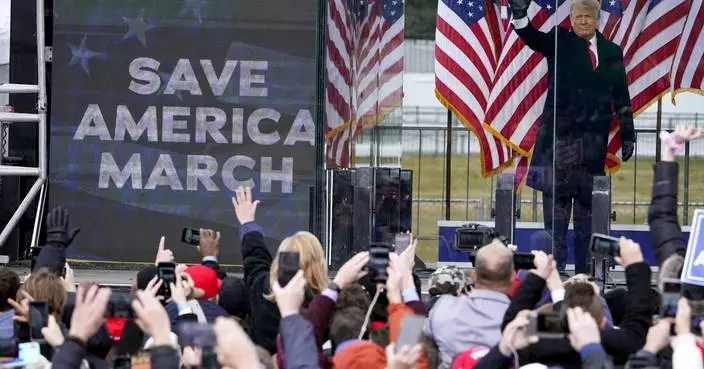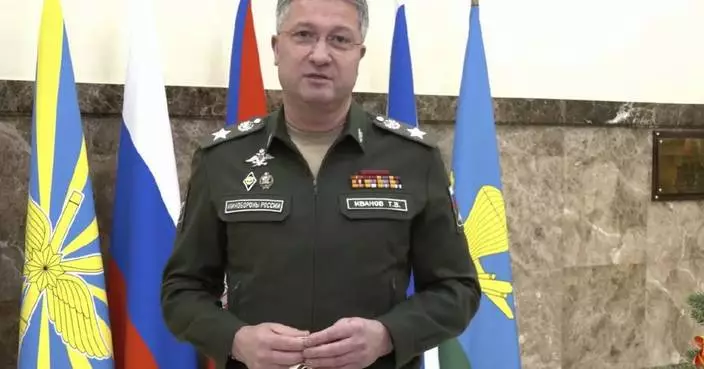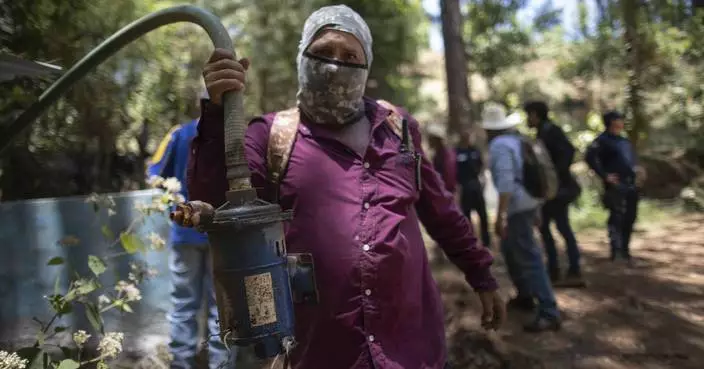President Donald Trump insisted that all was "very calm and calculated" at the White House, even as he vented Wednesday about the Russia probe, complained about Deputy Attorney General Rod Rosenstein and served noticed that "nice and new and 'smart'" missiles will be coming down on Syria.
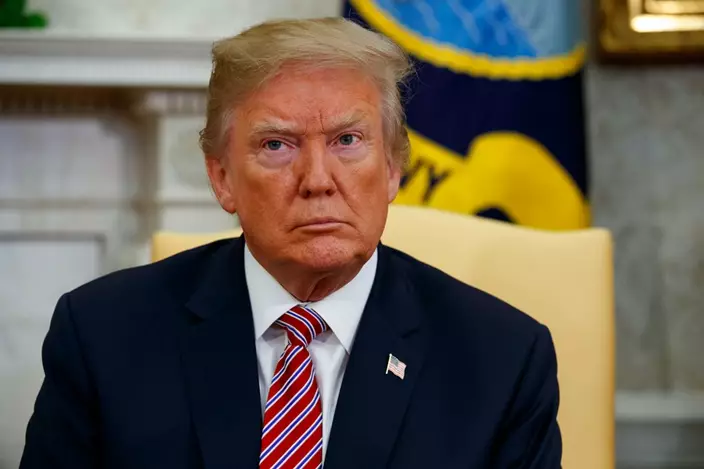
President Donald Trump listens as he meets with the Emir of Qatar Sheikh Tamim bin Hamad al-Thani in the Oval Office of the White House, Tuesday, April 10, 2018, in Washington. (AP Photo/Evan Vucci)
Trump, who was so incensed by the FBI's raid of his personal attorney's office and hotel room that he's privately pondered firing Rosenstein, let loose on Twitter Wednesday against the deputy attorney general and special counsel Robert Mueller. He said the Russia probe was "headed up by the all Democrat loyalists, or people that worked for Obama. Mueller is most conflicted of all (except Rosenstein who signed FISA & Comey letter). No Collusion, so they go crazy!"
Trump also tweeted: "No Collusion or Obstruction (other than I fight back), so now they do the Unthinkable, and RAID a lawyers office for information! BAD!" And he insisted the White House was "Very calm and calculated."
The raid, in which agents seized attorney Michael Cohen's records on topics including a $130,000 payment to a porn actress who alleges she had sex with Trump, left the president more angry than advisers had seen him in weeks, according to five people familiar with the president's views but not authorized to discuss them publicly.
Nervous White House aides expressed new fears about the president's unpredictability in the face of the Cohen raid, which he viewed as an assault on a longtime defender and a sign that Mueller's probe into potential ties between Russia and the Trump campaign was "going too far."
House Speaker Paul Ryan, for his part, tried to douse speculation Trump might fire Rosenstein or Mueller, saying: "I have no reason to believe that that's going to happen. I have assurances that it's not." He added that he had been "talking to people in the White House about it."
Trump has canceled plans to attend the Summit of the Americas over the weekend as well as an overnight visit to Colombia, citing the need to monitor the situation in Syria.
But the president had been telling confidants for weeks that he was not eager to make the three-day trip, according to two people who have discussed it with him in recent weeks but were not authorized to disclose the private conversations. And privately, Trump said he didn't want to be away from the White House amid developments in the China trade dispute and in the Mueller investigation.
Trump also expressed confidence in the loyalty displayed by Cohen, his longtime personal and professional fixer, who ascended to one of the most powerful roles at the Trump Organization not filled by a family member. Cohen has steadfastly denied wrongdoing in his $130,000 payment to adult-film actress Stormy Daniels and has publicly defended Trump, but he has confided in associates that he is fearful of being a fall guy, according to a person familiar with his thinking but not authorized to speak publicly about private discussions.
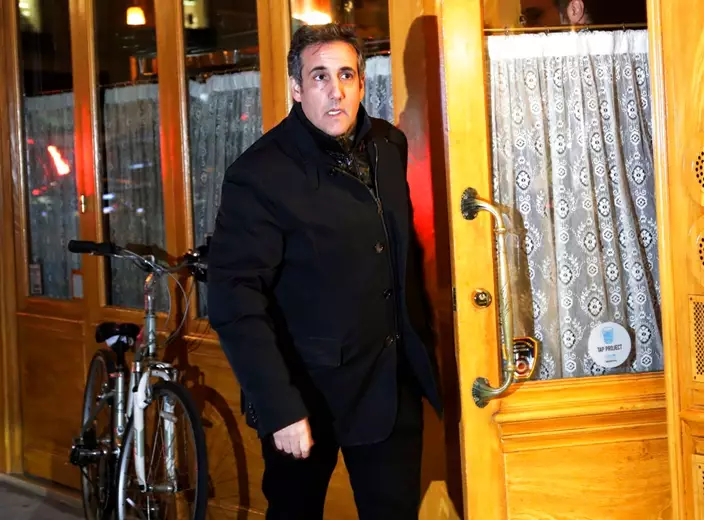
Michael Cohen, U.S. President Donald Trump's personal attorney, leaves a restaurant, Tuesday, April 10, 2018, in New York. FBI agents on Monday raided Cohen's home, hotel room and office, seizing records on topics including a $130,000 payment made to porn actress Stormy Daniels in exchange for her silence about an affair she said she had with Trump in 2006. (AP Photo/Frank Franklin II)
Cohen has said he took out a personal line of credit on his home to pay Daniels days before the 2016 election and without Trump's knowledge. The raid of his office was overseen by the U.S. attorney's office in Manhattan and based in part on a referral from Mueller.
Press secretary Sarah Huckabee Sanders made clear that White House officials have explored Trump's authority to fire Mueller.
"He certainly believes that he has the power to do so," she said at Tuesday's press briefing.
Under Justice Department regulations, only Rosenstein, who oversees the Russia investigation, can fire Mueller.
On Capitol Hill, a bipartisan group of four senators moved to protect Mueller's job.
Republican Sens. Thom Tillis of North Carolina and Lindsey Graham of South Carolina and Democratic Sens. Chris Coons of Delaware and Cory Booker of New Jersey planned to introduce legislation Wednesday that would give any special counsel a 10-day window in which he or she could seek expedited judicial review of a firing, according to two people familiar with the legislation. They were not authorized to discuss the bill ahead of its release and requested anonymity.
Trump spent Monday evening calling associates to vent and gauge their reaction to the news. He bitterly complained that the raids were meant to ruin Cohen's life and expressed frustration that it was another front from which to attack his presidency, according to a person familiar with the conversations but not permitted to discuss them publicly.
Trump also revived his broadsides on Rosenstein as well as Rosenstein's boss, Attorney General Jeff Sessions, whom he belittled to confidants for recusing himself from the investigation and, in turn, delivering him to Mueller.
The White House insisted Trump was focused on the response to Syria following the country's apparent use of chemical weapons on civilians over the weekend, killing more than 40 people. A military strike would mark Trump's second retaliatory strike against Syrian President Bashar Assad's government at a time when Trump is seeking to reduce the U.S. footprint in Syria.
The discussions come as Trump's newest national security adviser, John Bolton, stepped into the job this week. He encouraged Trump to skip the trip to South America to manage the Syria strategy.
Bolton, a seasoned bureaucratic operator, has been expected to put his stamp on the National Security Council staff. NSC spokesman Michael Anton resigned over the weekend, with two people familiar with the situation saying Anton resigned after learning he would be fired. Trump's homeland security adviser, Thomas Bossert, exited Tuesday. Bossert had overseen the administration's response to the 2017 hurricane season and was credited by his colleagues for leading the administration's efforts to bolster cybersecurity resiliency across government and private industry.
There is growing concern in Trump's orbit that the turmoil will only continue following the release next week of former FBI director James Comey's book, which promises to reveal new details about his conversations with the president and the Russia probe. An administration official said the White House would largely defer to outside surrogates to push back on Comey, but there was concern as to how the director's interviews could rile up the president.





